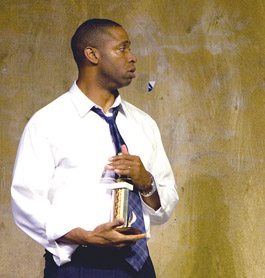home | metro silicon valley index | the arts | stage | review

Photograph by Mark Kitaoka
MEASURING UP: Political candidate Harmond Wilks (Aldo Billingslea) faces moral dilemmas in 'Radio Golf.'
Movin' On Up
TheatreWorks' version of August Wilson's 'Radio Golf' fearlessly confronts slippery moral slopes
By Ben Marks
ARE YOU a nigger or a negro? That's the blunt and ugly question posed to dapper, confident Harmond Wilks (Aldo Billingslea) by his moral conscience, Sterling Johnson (L. Peter Callender), in TheatreWorks' production of August Wilson's final play, Radio Golf. Wilks is a privileged Pittsburgh real-estate developer who is using his for-profit but publicly financed redevelopment project in the blighted Hill District as the springboard for his mayoral ambitions. Johnson is a freelance handyman, who was doing time in jail for robbery while Wilks was at a fancy university being groomed to take over his daddy's business.
Though Wilks and Johnson share roots in the Hill District, as well as skin color, their values could not be more different. Ironically, it is Johnson, the former criminal, who owns the high ground. Thanks to a hard-won appreciation for right and wrong, he immediately sees the injustice of tearing down a decrepit building that's in the way of Wilks' project but, inconveniently, is still inhabited by the former owner, Elder Joseph Barlow (Charles Branklyn). It doesn't matter if Wilks now owns the deed to the piece of property. The building's storied past, to say nothing of its present as Barlow's home, trumps pretty much everything. For Johnson, it's a matter of principle.
For Wilks, it's a matter of law, which in the end proves his redemption. In the meantime, he believes that it is perfectly within his rights to tear down the building. Wilks has successfully manipulated the white-man's system by using his race to better himself and his pragmatic wife, Mame (C. Kelly Wright). That, alas, is his slender moral authority. Wilks gets that, which is why he's convinced himself that he's somehow doing the greater community good on his way to personal aggrandizement. Naturally that's not good enough for the play's tough-minded author. The notion that Wilks owes something to his race if he is going to use it to get ahead is one of the central themes of Wilson's play, which is why in Radio Golf, negro is the more toxic N-word.
Along for the redevelopment ride is Wilks' partner, Roosevelt Hicks (Anthony J. Haney), whose passions are wealth, personal prestige and the game of golf. When it comes to selling out, Wilks is a piker compared to Hicks, who uses an afternoon of 18 holes with a group of high rollers to talk up a white businessman of questionable ethics named Bernie Smith. Smith, it turns out, needs a black partner so that he can purchase a radio station at an extremely favorable, minority-ownership price. Hicks is just the black man for the job. Haney's Hicks is so full of himself—so proud, for example, of his ability to finally tell his boss at the bank where to put it once the radio deals comes through—that we worry for him, lest he get taken to the cleaners by the powerful, presumably ruthless offstage white man. It's one of the many deft distractions that Wilson throws before us in this finely tuned play.
As Hicks, Haney is fearless, stretching his character to both its comic and tragic edges. The rest of the cast is every bit as engaging. In addition to the terrific Callender, Wright is arresting whenever she's onstage—her scene with Billingslea late in the second act is especially strong. If at times Billingslea plays his would-be politician a bit too convincingly (politicians lack sincerity), his scenes with Branklyn—packed with fast-paced, smart dialogue that is at once hilarious and moving—bring out the best in both actors.
RADIO GOLF, a TheatreWorks production, plays Tuesday–Wednesday at 7:30pm, Thursday–Friday at 8pm, Saturday at 2 and 8pm and Sunday at 2 and 7pm through Nov. 2 at the Mountain View Center for the Performing Arts, 500 Castro St., Mountain View. Tickets are $23–$61. (650.903.6000)
Send a letter to the editor about this story.
|
|
|
|
|
|